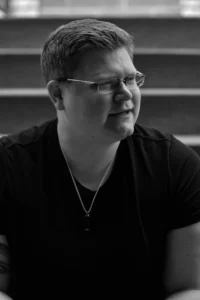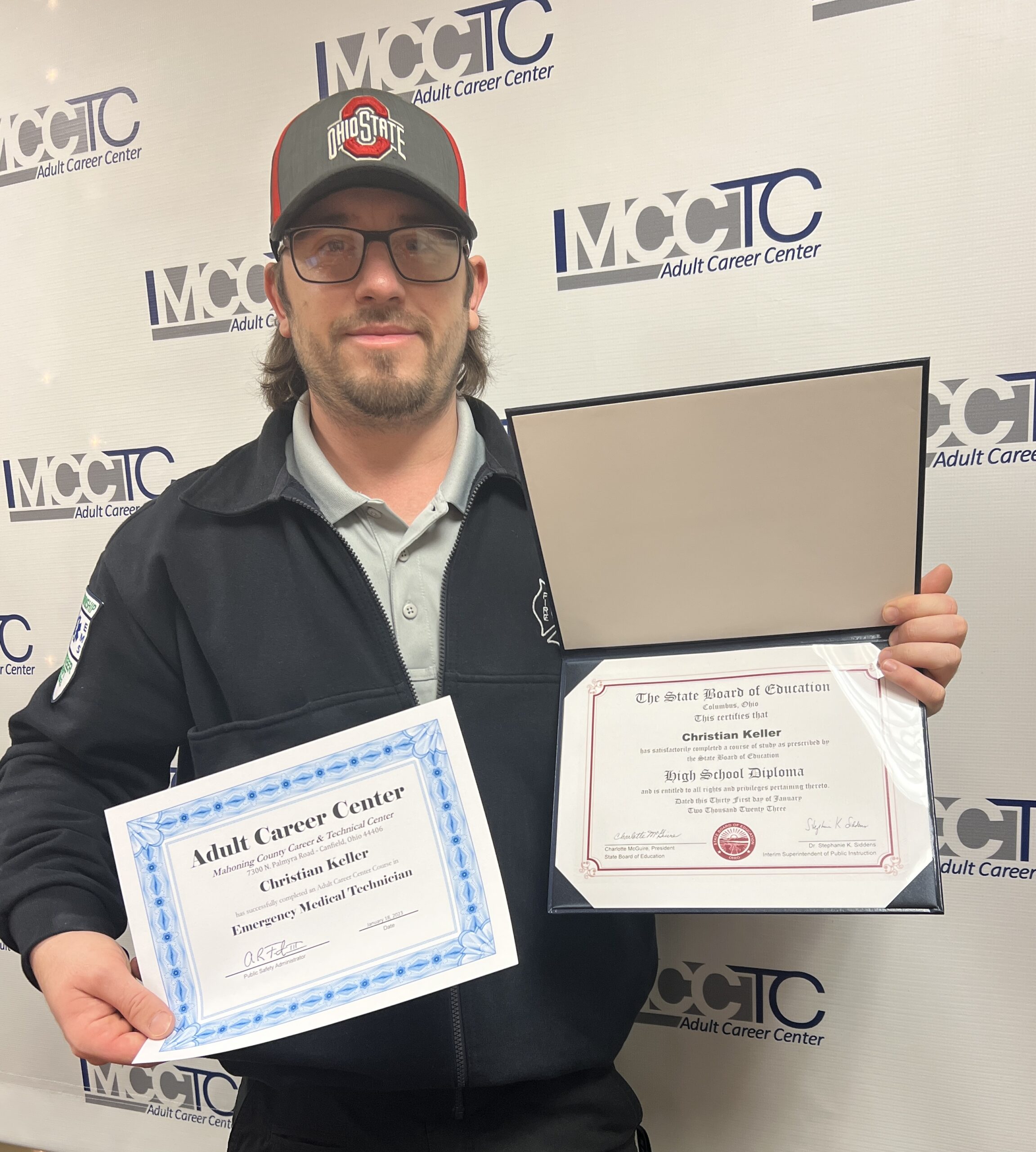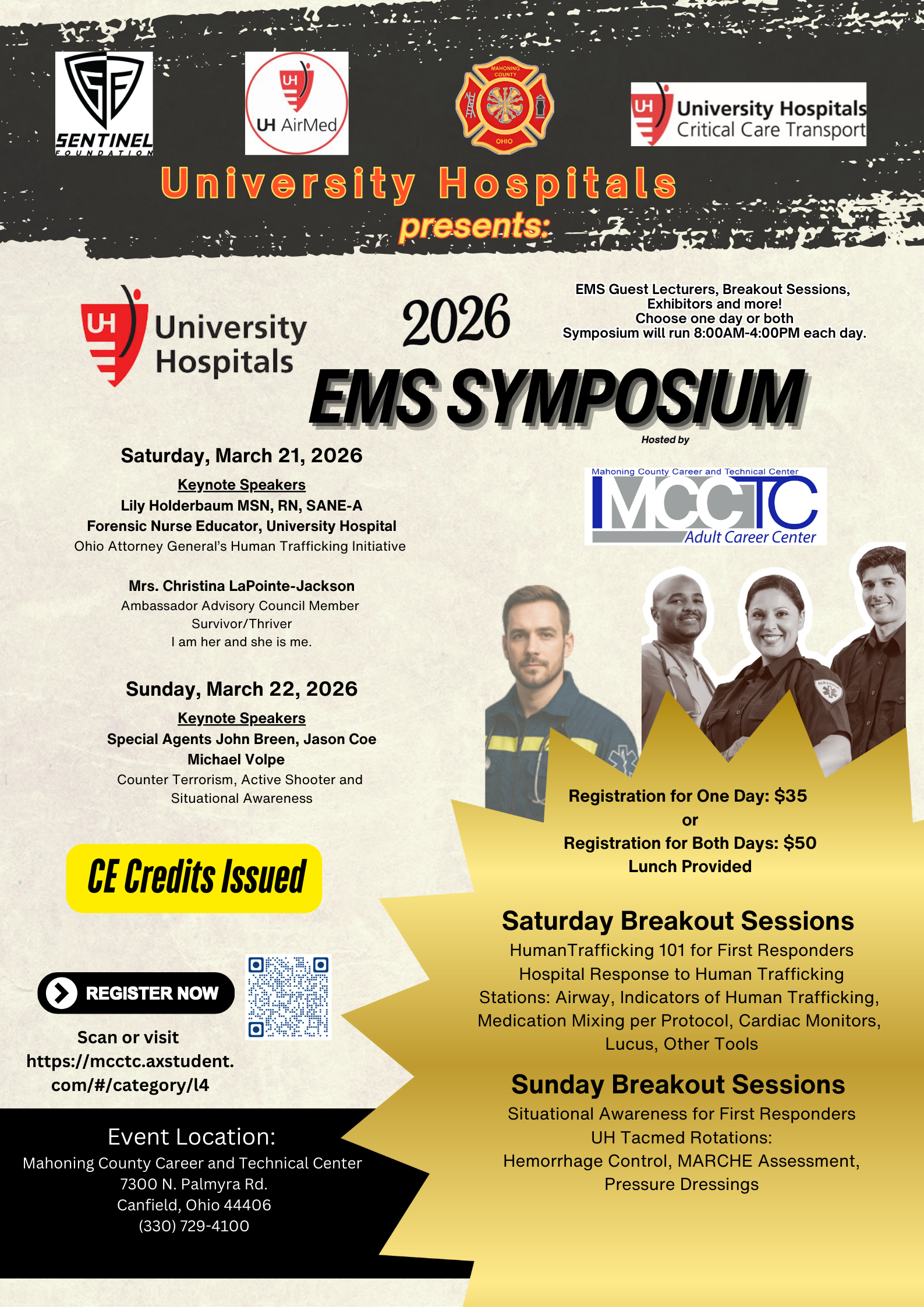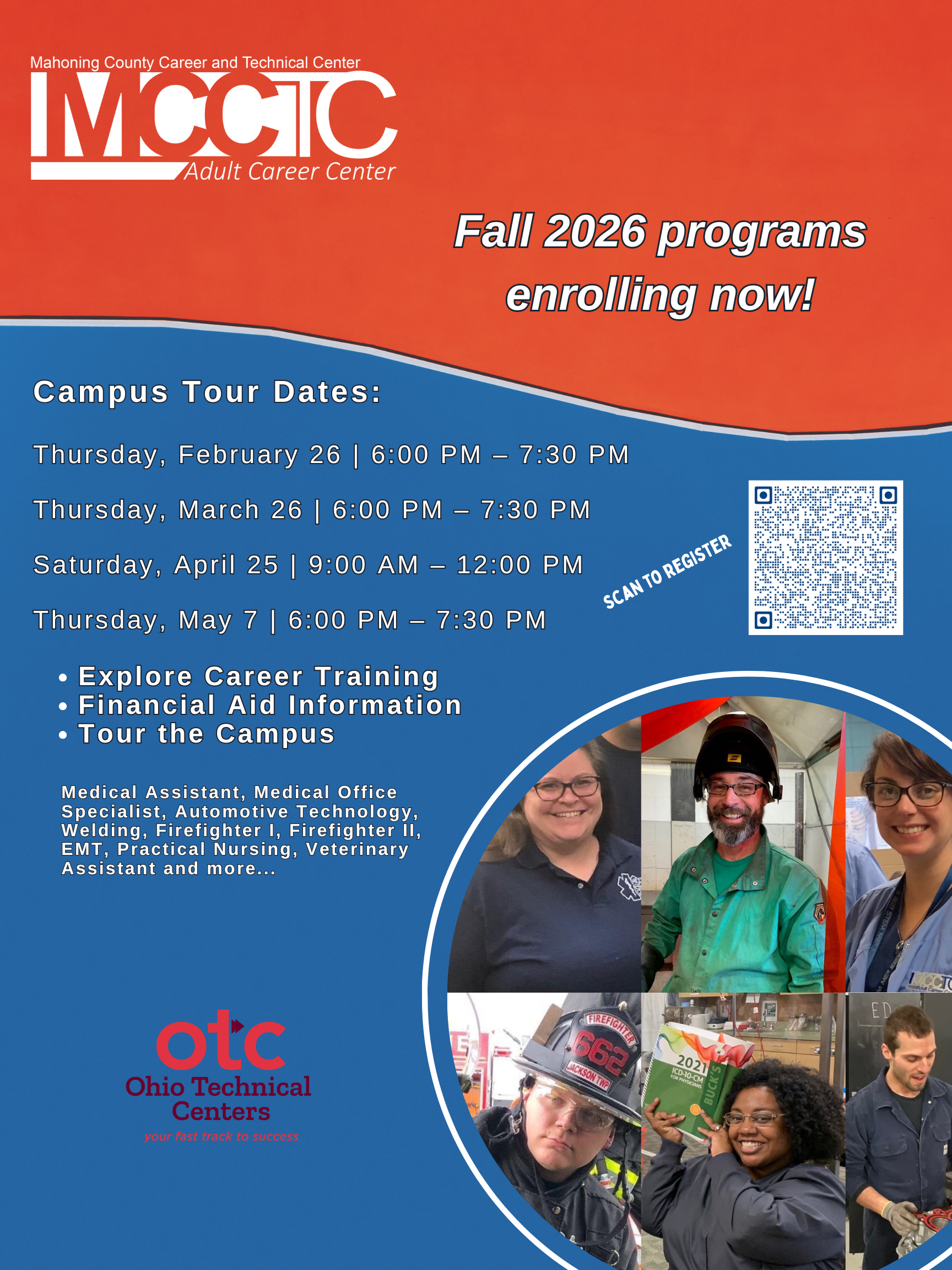A Second Chance in MCCTC’s Adult Career Center EMT Program
by Dom Fonce
June 14, 2023
Celebrating Ohio’s Adult Education Week
For Christian Keller, life has been about second chances. Christian grew up on the streets of Dallas, Texas without parents—surviving off scraps and occasional meals from police officers. In a few years, he would be adopted and raised by a Mennonite couple in the countryside. He calls that couple “Mom and Dad,” says they gave him his first second chance. Christian’s new second chance will come to fruition on June 29th, 2023 at MCCTC’s Recognition Ceremony, where he will be a keynote speaker. Not only has Christian completed MCCTC’s EMT program, but he has completed Ohio’s Adult Diploma Program, meaning he has earned his high school diploma. These accolades are impressive, but Christian’s journey to accomplish these goals—the reason why he believes MCCTC has given him a second chance—is even more astonishing. His story is one of loss and perseverance, being helped and helping others, sad lows and successful highs.
Christian recounts a moment where he and his EMT coworkers picked up a man who was suffering from a panic attack. He says, “It was the anniversary of [the man’s] daughter’s death. She had been dead for 30 years. I think about that all the time, because that could be me in 30 years.” Then Christian tells me he lost his daughter, and later a son, at birth during his first attempt at MCCTC’s EMT program. The stress of his loss, and the grief that came with it, forced him to step away from the program, step away from a grant that fully funded his education.
I ask him if his loss impacts his approach to work. “Most definitely,” he says. “The caring and compassion inside of me comes out. I’m all about paying it forward. The hospitals took care of us both times. They didn’t have to. One of these days, it’ll be one of those ambulance crews taking care of me.” He tells me he imagines his children growing up over time, imagines talking with them—that his daughter would be four this year, would be doing gymnastics and beginning preschool. As he says this, I think he’s paying forward the love, although brief, his children gave him. I think he wants to make his children proud, and that means helping others in the ways the medical professionals at the hospitals helped his family.
Christian dealt with a lot of suspicion and doubters while he stepped away from his program—people not understanding that he needed time to heal. He tells me, once he was ready to return to the program, that MCCTC did everything they could to obtain another grant for him. He says, “In the summer of 2022, I called the Adult Career Center and asked for a huge favor to come back to the program…they made a couple calls to get me back in the Adult Diploma Program. Then we buckled down, worked our butts off, and made it happen.” He shows me a Facebook post he made with a picture of him holding his diploma in one hand and his EMT certificate in the other. The post reads “Never Give Up.” He says this is a motto he lives by.
Christian believes the most passionate EMTs have trauma intertwined through their pasts. They join this field to help lessen the trauma that others presently face. He tells me the story of his sister passing away when he was a child. He says, “It took an ambulance 30 minutes to get to us. Nobody knew what to do. I hated feeling helpless. I knew I wanted to learn how to help others in a crisis.” I am wondering if these people become EMTs because, having faced their own trauma, witnessing others’ traumatic experiences doesn’t debilitate them. Christian says, “We see people on their worst days. I might be angry or exhausted, but I can’t show it.” I believe that. To voluntarily choose this career path takes obvious day-in-day-out toughness. For the sake of the patient, and their care, people like Christian remain strong even when things are at their worst.
He tells me he works a 24-hour, 7 a.m. to 7 a.m. shift as an EMT. “By noon on my last shift, I already had seven unconscious overdoses,” he says. “It’s tough because most of them are young people. There’s something behind that trend, driving them to do that.” Then he describes what it’s like bringing someone back from death, giving someone a second chance at life. He says, “They are basically dead, and you can bring them back. It’s an awesome moment. In the past month, we brough three or four people back.” Christian calls this a “solemn” experience—we go on discussing how intense the ambulance must be. In these high-stakes, life-or-death resuscitations, four or five medical professionals are working in synch with pinpoint focus, holding their breath and waiting for the heart rate to jump again on the monitor. I ask if there’s a collective sigh of relief when the monitor shows a beat. He says, “Yes.”
I think this is what Christian means by “paying it forward.” Because he’s been given many second chances, he wants to give people their second chance. This is how he does it, by fighting for their lives. He and his coworkers want nothing more than to see their patients be alive, healthy, and mentally sound. When a siren whirls in the distance, or an ambulance races past your house, be assured that everyone working in the back is fighting. This is why we stop for ambulances on the road in Ohio—sacrifice a little of our time for another’s second chance.
I ask if Christian is nervous to be a keynote speaker at the upcoming Recognition Ceremony. He says, “I get nervous, but I’m not afraid. You take a deep breath, start talking, and let it come out.” Many people called Christian a quitter when he dropped out of the program, but he says, “If you surround yourself with good people, you will succeed.” He wants to point all fingers back at MCCTC during his speech, especially Adult Career Center Supervisor, Mary Mihalopoulos, and Lead EMT Instructor, Frank Dispenza for pushing him towards success. He says this would’ve been impossible to do without the Adult Career Center’s support. Beyond the family and friends that did support Christian, it’s obvious that he’s found good, caring people at MCCTC. It can be as traumatic as defibrillating someone back to life, as small as pulling over to the side of the road for an ambulance, as stressful as calling around for student grant money, or as momentous as adopting a child, but giving a chance means sacrificing a risk for a reward, and giving a second chance means caring for someone at their lowest, bringing them up when they are down.

Dom Fonce is a Marketing Content Writer for Mahoning County Career and Technical Center Adult Career Center. He holds a bachelor’s degree in English from Youngstown State University and a Master of Fine Arts degree from the NEOMFA. He has published two books of poetry. His work can be found at domfoncepoetry.com.



